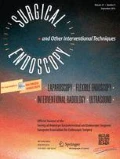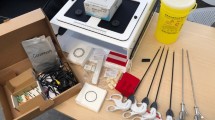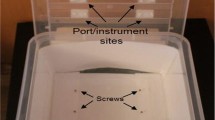Abstract
Background
Several challenges exist with laparoscopic skills training in resource-restricted countries, including long travel distances required by mentors for onsite teaching. Telesimulation (TS) is a novel concept that uses the internet to link simulators between an instructor and a trainee in different locations. The purpose of this study was to determine the effectiveness of telesimulation for teaching the Fundamentals of Laparoscopic Surgery (FLS) to surgeons in Botswana, Africa.
Methods
A total of 16 surgeons from two centers in Botswana participated in this 8-week study. FLS TS was set up using two simulators, computers, webcams, and Skype™ software for eight surgeons in the TS group. A standard FLS simulator was available for the eight surgeons in the self-practice (SP) group. Participants in the TS group had one remote training session per week with an FLS proctor at the University of Toronto who provided feedback and demonstrated proper technique. Participants in the SP group had access to the FLS DVD and were instructed to train on FLS at least once per week. FLS post-test scores were obtained in Botswana by a trained FLS proctor at the conclusion of the study.
Results
Participants in the TS group had significantly higher post-test FLS scores than those in the SP group (440 ± 56 vs. 272 ± 95, p = 0.001). All trainees in the TS group achieved an FLS simulator certification passing score, whereas only 38% in the SP group did so (p = 0.03).
Conclusion
Remote telesimulation is an effective method for teaching the Fundamentals of Laparoscopic Surgery in Africa, achieving a 100% FLS skills pass rate. This training platform provides a cost-effective method of teaching in resource-restricted countries and could be used to teach laparoscopic skills anywhere in the world with internet access.


Similar content being viewed by others
References
Apostolou C, Panieri E (2007) National survey of surgeons’ attitudes to laparoscopic surgical training in South Africa. S Afr J Surg 45(3):86, 88, 90-91
Baraza R (2005) Laparoscopic cholecystectomy at the Nairobi Hospital: a personal experience with 42 cases. East Afr Med J 82(9):473–476
Bendinelli C, Leal T, Moncade F, Dieng M, Toure CT, Miccoli P (2002) Endoscopic surgery in Senegal. Benefits, costs and limits. Surg Endosc 16(10):1488–1492
Raiga J, Kasia JM, Bruhat MA (1999) Laparoscopic surgery in the Cameroon. Int J Gynaecol Obstet 65(1):65–66
SAGES Go Global Initiative 2009. Available at www.sages.org/projects/go_global Accessed 10 Feb 2009
Okrainec A, Smith L, Azzie G (2009) Surgical simulation in Africa: the feasibility and impact of a three day fundamentals of laparoscopic surgery course. Surg Endosc 23, [Epub ahead of print]
Peters JH, Fried GM, Swanstrom LL, Soper NJ, Sillin LF, Schirmer B, Hoffman K (2004) Development and validation of a comprehensive program of education and assessment of the basic fundamentals of laparoscopic surgery. Surgery 135(1):21–27
Fundamentals of laparoscopic surgery 2009. Available at www.flsprogram.org/ Accessed 4 Feb 2009
Derossis AM, Fried GM, Abrahamowicz M, Sigman HH, Barkun JS, Meakins JL (1998) Development of a model for training and evaluation of laparoscopic skills. Am J Surg 175(6):482–487
Ericsson KA (1996) The acquisition of expert performance: an introduction to some of the issues. In: The road to excellence: the acquisition of expert performance in the arts and sciences, sports, and games. Lawrence Erlbaum Associates, Mahwah, NJ, pp 1–50
Ericsson KA (2009) Deliberate practice and the acquisition and maintenance of expert performance in medicine and related domains. Acad Med 79(10 Suppl):S70–S81
Marescaux J, Soler L, Mutter D, Leroy J, Vix M, Koehl C, Clement JM (2000) Virtual university applied to telesurgery: from teleeducation to telemanipulation. Stud Health Technol Inform 70:195–201
Malassagne B, Mutter D, Leroy J, Smith M, Soler L, Marescaux J (2001) Teleeducation in surgery: European Institute for telesurgery experience. World J Surg 25(11):1490–1494
Moulton CA, Dubrowski A, MacRae H, Graham B, Grober E, Reznick R (2006) Teaching surgical skills: what kind of practice makes perfect? a randomized, controlled trial. Ann Surg 244(3):400–409
Skype™ 2009. Available at www.skype.com Accessed 13 Feb 2009
Acknowledgments
Special thanks to Lisa Jukelevics from SAGES for her continued help and support throughout this project. This study was supported by a SAGES research grant.
Author information
Authors and Affiliations
Corresponding author
Rights and permissions
About this article
Cite this article
Okrainec, A., Henao, O. & Azzie, G. Telesimulation: an effective method for teaching the fundamentals of laparoscopic surgery in resource-restricted countries. Surg Endosc 24, 417–422 (2010). https://doi.org/10.1007/s00464-009-0572-6
Received:
Revised:
Accepted:
Published:
Issue Date:
DOI: https://doi.org/10.1007/s00464-009-0572-6




